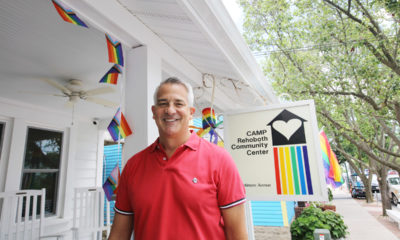National
Remembering the lives we lost in 2018
Tab Hunter, SpongeBob creator, AIDS activists and others


Actor and 1950s heartthrob Tab Hunter died earlier this year. (Photo courtesy the Film Collaborative)
Many acclaimed LGBTQ people died in 2018 from the worlds of entertainment, sports, advocacy, business and beyond. They include:
Victor Salisbury, a Realtor, banking analyst, gay rights supporter and D.C. area resident, died on Jan. 4 at 66.
Eddie Weingart, a D.C.-based massage therapist and anti-gun violence activist died at age 39 on Jan. 11. After the 2012 Newtown, Conn. mass shooting at Sandy Hook Elementary School, he helped to found the Project to End Gun Violence. In 2013, Weingart received the “Be the Change Award from the Washington Peace Center for his advocacy.
Dr. Mathilde Krim, a wealthy straight scientist and who was a pioneer in AIDS activism and research, died on Jan. 15 at age 91. She was the founding chairwoman of amfAR, the Foundation for AIDS Research. In 2000, she received the Presidential Medal of Freedom, the nation’s highest civilian honor.
Dennis Peron who led an effort to legalize marijuana for medical purposes in California died on Jan. 27 at age 71 in a San Francisco hospital.
Robert Pincus-Witten, a renowned art critic, died on Jan. 28 at 82 after a long illness.
John Mahoney, British-born actor, beloved for his portrayal of Martin Crane, the father on the hit TV sitcom “Frasier,” died on Feb. 3 at age 77. He was nominated twice for an Emmy for his role on “Frasier.”
Judy Blame, the fashion stylist, died at age 58 from cancer in London on Feb. 20. There was a retrospective of Blame’s work at the ICA in London in 2016.
David Ogden Stiers, who played Maj. Charles Emerson Winchester III in the renowned TV show “MASH,” died March 3 at age 75. At age 66, he came out as queer.
Barbara Wersba, an acclaimed lesbian author of books for young adults, died at age 85 on Feb. 18 in Englewood, N.J. She was among the first YA authors to write about same-sex relationships.
Hubert de Givenchy, the renowned French fashion designer who for decades dressed icons from Jacqueline Kennedy to Grace Kelley to Audrey Hepburn, died at age 91 on March 10.
Steve Elkins, founder and executive director of CAMP Rehoboth in Rehoboth Beach, Del., died at age 67 on March 15.
J.D. McClatchy, a Lambda Award-winning-poet, died at age 72 on April 10. He was the author of eight poetry collections and several opera librettos, including “Our Town” for Ned Rorem’s settings of Thornton Wilder’s drama.
Jean McFaddin, who planned Macy’s Thanksgiving Day parades, Santaland at Christmas, spring flower shows and July 4th fireworks in Manhattan for 24 years, died on April 18.
Richard Peck, a gay author of stories about rape, suicide and other difficult topics for young readers, died on May 27 at age 84.
LGBTQ rights activist Connie Kurtz died at age 81 at her home in West Palm Beach, Fla. Kurtz and her wife Ruth Berman were plaintiffs in a lawsuit over domestic partner benefits for New York City school employees.
On April 14, David Buckel, a prominent LGBTQ rights lawyer and environmental advocate, age 60, committed suicide by dousing himself with gas and setting himself on fire, in Brooklyn, N.Y. His death was a political act of self-immolation.
Robert M. Higdon, a friend of President Ronald Reagan and Nancy Reagan and fund-raising director for the Reagan Presidential Library, died at age 58 on June 19.
Dick Leitsch, a pioneering gay rights activist, died at age 83 on June 22 in Manhattan. In 1966, Leitsch led a protest when a bartender at Julius’ in the West Village in New York wouldn’t serve openly gay patrons.
Tab Hunter, a 1950s movie star, died on July 8 at age 86. He was closeted until he came out in his 2005 autobiography (written with Eddie Muller) “Tab Hunter Confidential.”
Tom Gallagher, the first Foreign Service officer to come out publicly as gay, died on July 8 at age 77. “I don’t want any of you… ever to take for granted what it took for people like Tom Gallagher to pave the way for all of you,” Hillary Clinton said in 2012 on the 20th anniversary of GLIFAA, a State Department LGBT employee organization.
Melanie Kaye/Kantrowitz, feminist, activist and author died at age 72 on July 10.
Gary Beach, an actor who won a Tony Award for his performance as director Roger De Bris in “The Producers,” died at age 70 on July 17.
Charles Hamlen, the founder of Classical Action: Performing Arts Against AIDS, died at age 75 on Aug. 1. He started the group, which later merged with Broadway Cares/Equity Fights AIDS, in 1993 five years after his partner died of AIDS in 1988.
John Glines, who won a Tony Award as a producer of “Torch Song Trilogy,” in 1983, died on Aug. 8 at age 84. At the Tonys, Glines thanked his lover Lawrence Lane. It’s believed to have been the first time anyone at the Tonys said they were thanking their gay lover, reported the New York Times.
Vivian Matalon, who won a Tony Award for directing “Mornings at Seven” in 1980, died at age 88 on Aug. 15.
Craig Zadan, who with his producing partner Neil Meron, won the Academy Award for best picture for Chicago in 2003, died on Aug. 21 at age 69. They produced “The Sound of Music” and other live musical revivals for NBC.
Rev. Robert Wood, the first American clergy to support marriage equality and to urge churches to welcome gay people died on Aug. 20 at age 95, the Blade reported.
Lindsay Kemp, a choreographer and teacher of David Bowie and Kate Bush, died at age 80 on Aug. 24. Kemp and Bowie were lovers for a time.
Crime writer Amanda Kyle Williams died at age 61 on Aug. 31. She is the author of the Keye Street series, whose titles include “The Stranger You Seek.”
Disability advocate and gay rights activist Janet Weinberg died on Sept. 1 at age 63. She was a leader at LGBTQ rights groups, including the Gay Men’s Health Crisis Center.
Jeanne Ashworth, who won a bronze medal in the 500-meter race at the 1960 Winter Olympics in Squaw Valley, Calif., died on Oct. 4 at age 80 at her home in Wilmington, N.Y. She was one of the first women to compete in speedskating in the Olympics.
Ruth Gates, an acclaimed coral-reef biologist and marine conservationist died at age 56 from brain cancer on Oct. 25. Gates advocated breeding a “super coral” to resist the impact of climate change.
Maria Irene Fornés, a playwright who won eight Obie awards, died at age 88 on Oct. 30. Acclaimed for her experimental theater work, she received an Obie for lifetime achievement in 1982. “She’s not spoken of as an important American playwright, and she should be,” playwright Tony Kushner told the New York Times.
Ray Hill, a former Baptist evangelist and ex-convict who became a Houston LGBT rights activist and helped to organize the first gay rights march on Washington died at age 78 on Nov. 24. In the 1980s, he helped to found Omega House for AIDS patients. Hill hosted a radio talk show for prisoners and their families.
Stephen Hillenburg, the creator of the cultural phenomenon “SpongeBob SquarePants” died at age 57 on Nov. 26. Hillenburg, who was straight, had amyotrophic lateral sclerosis. “SpongeBob,” the animated adventures of a yellow, pineapple-dwelling, sea creature, that airs on Nickelodeon, has a big queer following.

The Comings & Goings column is about sharing the professional successes of our community. We want to recognize those landing new jobs, new clients for their business, joining boards of organizations and other achievements. Please share your successes with us at [email protected].
Congratulations to Gil Pontes III on his recent appointment to the Financial Advisory Board for the City of Wilton Manors, Fla. Upon being appointed he said, “I’m honored to join the Financial Advisory Board for the City of Wilton Manors at such an important moment for our community. In my role as Executive Director of the NextGen Chamber of Commerce, I spend much of my time focused on economic growth, fiscal sustainability, and the long-term competitiveness of emerging business leaders. I look forward to bringing that perspective to Wilton Manors — helping ensure responsible stewardship of public resources while supporting a vibrant, inclusive local economy.”
Pontes is a nonprofit executive with years of development, operations, budget, management, and strategic planning experience in 501(c)(3), 501(c)(4), and political organizations. Pontes is currently executive director of NextGen, Chamber of Commerce. NextGen Chamber’s mission is to “empower emerging business leaders by generating insights, encouraging engagement, and nurturing leadership development to shape the future economy.” Prior to that he served as managing director of The Nora Project, and director of development also at The Nora Project. He has held a number of other positions including Major Gifts Officer, Thundermist Health Center, and has worked in both real estate and banking including as Business Solutions Adviser, Ironwood Financial. For three years he was a Selectman, Town of Berkley, Mass. In that role, he managed HR and general governance for town government. There were 200+ staff and 6,500 constituents. He balanced a $20,000,000 budget annually, established an Economic Development Committee, and hired the first town administrator.
Pontes earned his bachelor’s degree in political science from the University of Massachusetts, Dartmouth.
Kansas
ACLU sues Kansas over law invalidating trans residents’ IDs
A new Kansas bill requires transgender residents to have their driver’s licenses reflect their sex assigned at birth, invalidating current licenses.

Transgender people across Kansas received letters in the mail on Wednesday demanding the immediate surrender of their driver’s licenses following passage of one of the harshest transgender bathroom bans in the nation. Now the American Civil Liberties Union is filing a lawsuit to block the ban and protect transgender residents from what advocates describe as “sweeping” and “punitive” consequences.
Independent journalist Erin Reed broke the story Wednesday after lawmakers approved House Substitute for Senate Bill 244. In her reporting, Reed included a photo of the letter sent to transgender Kansans, requiring them to obtain a driver’s license that reflects their sex assigned at birth rather than the gender with which they identify.
According to the reporting, transgender Kansans must surrender their driver’s licenses and that their current credentials — regardless of expiration date — will be considered invalid upon the law’s publication. The move effectively nullifies previously issued identification documents, creating immediate uncertainty for those impacted.
House Substitute for Senate Bill 244 also stipulates that any transgender person caught driving without a valid license could face a class B misdemeanor, punishable by up to six months in jail and a $1,000 fine. That potential penalty adds a criminal dimension to what began as an administrative action. It also compounds the legal risks for transgender Kansans, as the state already requires county jails to house inmates according to sex assigned at birth — a policy that advocates say can place transgender detainees at heightened risk.
Beyond identification issues, SB 244 not only bans transgender people from using restrooms that match their gender identity in government buildings — including libraries, courthouses, state parks, hospitals, and interstate rest stops — with the possibility for criminal penalties, but also allows for what critics have described as a “bathroom bounty hunter” provision. The measure permits anyone who encounters a transgender person in a restroom — including potentially in private businesses — to sue them for large sums of money, dramatically expanding the scope of enforcement beyond government authorities.
The lawsuit challenging SB 244 was filed today in the District Court of Douglas County on behalf of anonymous plaintiffs Daniel Doe and Matthew Moe by the American Civil Liberties Union, the ACLU of Kansas, and Ballard Spahr LLP. The complaint argues that SB 244 violates the Kansas Constitution’s protections for personal autonomy, privacy, equality under the law, due process, and freedom of speech.
Additionally, the American Civil Liberties Union filed a temporary restraining order on behalf of the anonymous plaintiffs, arguing that the order — followed by a temporary injunction — is necessary to prevent the “irreparable harm” that would result from SB 244.
State Rep. Abi Boatman, a Wichita Democrat and the only transgender member of the Kansas Legislature, told the Kansas City Star on Wednesday that “persecution is the point.”
“This legislation is a direct attack on the dignity and humanity of transgender Kansans,” said Monica Bennett, legal director of the ACLU of Kansas. “It undermines our state’s strong constitutional protections against government overreach and persecution.”
“SB 244 is a cruel and craven threat to public safety all in the name of fostering fear, division, and paranoia,” said Harper Seldin, senior staff attorney for the ACLU’s LGBTQ & HIV Rights Project. “The invalidation of state-issued IDs threatens to out transgender people against their will every time they apply for a job, rent an apartment, or interact with police. Taken as a whole, SB 244 is a transparent attempt to deny transgender people autonomy over their own identities and push them out of public life altogether.”
“SB 244 presents a state-sanctioned attack on transgender people aimed at silencing, dehumanizing, and alienating Kansans whose gender identity does not conform to the state legislature’s preferences,” said Heather St. Clair, a Ballard Spahr litigator working on the case. “Ballard Spahr is committed to standing with the ACLU and the plaintiffs in fighting on behalf of transgender Kansans for a remedy against the injustices presented by SB 244, and is dedicated to protecting the constitutional rights jeopardized by this new law.”
National
After layoffs at Advocate, parent company acquires ‘Them’ from Conde Nast
Top editorial staff let go last week

Former staff members at the Advocate and Out magazines revealed that parent company Equalpride laid off a number of employees late last week.
Those let go included Advocate editor-in-chief Alex Cooper, Pride.com editor-in-chief Rachel Shatto, brand partnerships manager Erin Manley, community editor Marie-Adélina de la Ferriére, and Out magazine staff writers Moises Mendez and Bernardo Sim, according to a report in Hollywood Reporter.
Cooper, who joined the company in 2021, posted to social media that, “Few people have had the privilege of leading this legendary LGBTQ+ news outlet, and I’m deeply honored to have been one of them. To my team: thank you for the last four years. You’ve been the best. For those also affected today, please let me know how I can support you.”
The Advocate’s PR firm when reached by the Blade said it no longer represents the company. Emails to the Advocate went unanswered.
Equalpride on Friday announced it acquired “Them,” a digital LGBTQ outlet founded in 2017 by Conde Nast.
“Equalpride exists to elevate, celebrate and protect LGBTQ+ storytelling at scale,” Equalpride CEO Mark Berryhill said according to Hollywood Reporter. “By combining the strengths of our brands with this respected digital platform, we’re creating a unified ecosystem that delivers even more impact for our audiences, advertisers, and community partners.”
It’s not clear if “Them” staff would take over editorial responsibilities for the Advocate and Out.



















